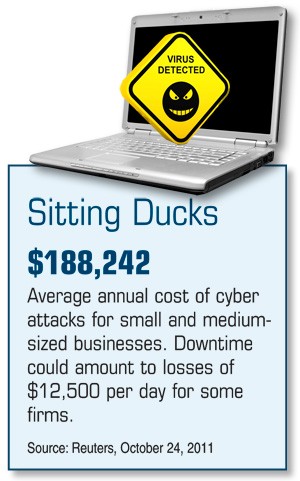Small Companies Face Costly Cybersecurity Threats
 Possibly because many large corporations have enhanced their security policies, 40% of all targeted Internet attacks are directed toward more vulnerable companies with fewer than 500 employees. Unfortunately, only 52% of small businesses have a basic cybersecurity plan.1
Possibly because many large corporations have enhanced their security policies, 40% of all targeted Internet attacks are directed toward more vulnerable companies with fewer than 500 employees. Unfortunately, only 52% of small businesses have a basic cybersecurity plan.1
Small businesses often use the Internet to market their products and services, accept electronic payments, and run their operations effectively. Owners who ignore potential cybersecurity issues may be taking a significant risk.
Whether a company relies on one laptop computer or depends heavily on e-commerce, small-business owners can shore up their defenses and help protect their financial interests.
To help owners understand basic precautions, the Federal Communications Commission (FCC) has introduced the Small Biz Cyber Planner (www.fcc.gov/cyberplanner), a free online tool that allows visitors to customize a planning guide based on their online presence.
Here are a few general cybersecurity tips for small businesses from the FCC.
- Install and update antivirus and antispyware software on every computer.
- Maintain firewalls between the internal network and the Internet to keep outsiders from accessing data on a private network, and make sure that home computers used to conduct business also have firewalls.
- If you have a Wi-Fi network, set it up so that the network name is hidden and a secure password is required for access.
- Create backup copies of important business data and information.
- Lock up computers to prevent them from falling into the wrong hands. Notebooks and tablets, in particular, can easily be stolen if left unattended.
- Train employees in security practices and set up a separate account for each user. Limit the authority to install software and provide access only to the data needed for users to perform their jobs.
- Require all passwords to be changed on a regular basis.
Recovering from a breach can be time-consuming and expensive for companies with smaller staffs and limited resources. Moreover, a company may be held responsible if its customers’ personally identifiable information is disclosed. Internet liability insurance may help shield firms conducting business on the Web from risks related to computer hacking, spam, viruses, and other online perils (up to policy limits).
1) Reuters, October 24, 2011
The information in this article is not intended as tax or legal advice, and it may not be relied on for the purpose of avoiding any federal tax penalties. You are encouraged to seek tax or legal advice from an independent professional advisor. The content is derived from sources believed to be accurate. Neither the information presented nor any opinion expressed constitutes a solicitation for the purchase or sale of any security. This material was written and prepared by Emerald. Copyright © 2012 Emerald Connect, Inc.

